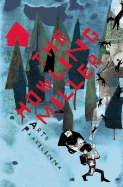A tribute to Tony Hillerman, who died on Sunday, from Craig Johnson, author of Another Man's Moccasins and Kindness Goes Unpunished, among other titles:
There was an owl on one of the teepee poles at my ranch last night and, if you're lucky enough to live adjacent to Indian Country, you pay attention to such things. The Cheyenne see the owls as messengers from the other side, and I couldn't help but wonder who it was that was sending something a little more than special delivery.
I always thought he looked a little like an owl, even before I met him. The way the tufts of hair perched up on his head and the pointed nose--but most of all, it was the eyes; not so much the eyes of an eagle because those carry a self-concern, but more like the eyes that see past self-interest.
He was 83, and he lived in Albuquerque with, in his own words "now-and-then rhematic arthritis, in-remission cancer, a minor heart-attack, a mediocre eye, one tricky ankle and two unreliable knees." He began teaching at the University of New Mexico in 1967 and, with a wife and six children, he struggled to make ends meet. The story goes that he was typing away in his office late one night and an associate enthused, "You must be the hardest-working professor we have here at the University."
He looked up with the twinkle his eyes always carried, his glasses perched at the end of his nose. "Actually, I'm writing a book."
Undaunted, the woman remarked. "How wonderful, what's it about?"
"It's a mystery."
She was crest-fallen. "With all your knowledge of Navajo art, culture, society and history--why are you wasting your time writing a mystery novel?"
His response, like the man, was eloquent and authentic. "Because I want someone to read the darned thing, that's why."
I was fortunate enough to win a short story award in combination with the writing conference that is named after him and Cowboys & Indians Magazine. He'd written 17 books in his series when I met him, was a New York Times bestselling fixture, and had won every award you can imagine. I'd written one novel and was facing the daunting task of trying to write my second, so I asked him how you keep it fresh. He smiled the small grin that reflected the admiration, adoration, and respect that everyone had for him. "At the risk of sounding like a bad sports analogy, you gotta write 'em one at a time--and just remember to tell a good story." It is invaluable advice.
At a time when you usually have to beg most big-time authors to remember what it was like when they were climbing up the ladder, he wrote me a blurb for not only my first novel, but my second, because he said he'd enjoyed them so much. I still have the voice message on my answering machine where he read the jacket quote because his e-mail was on the fritz. "Umm, Craig, I can't get this e-mail thingy to work, so I thought I'd just call you and tell you what to put on your book."
One of the last times I saw him was when he was being feted at the Los Angeles Times Festival of Books. They gave him their Life Achievement Award, and the hall where he was interviewed was standing room only, and the line to have him sign his books was about a mile long. He was a storyteller whose owl-like eyes saw further than the genre and farther than himself.
Perhaps the best words to describe his legacy are those of his protagonist Jim Chee, "Everything is connected. The wing of the corn beetle effects the direction of the wind, the way the sand drifts, the way the light reflects into the eye of man beholding his reality. All is part of totality, and in this totality man finds his horzo, his way of walking in harmony, with beauty all around him."






SHELFAWARENESS.0213.S4.DIFFICULTTOPICSWEBINAR.gif)





 Debut novelists Anisha Lakhani (Schooled), Dalia Sofer (The Septembers of Shiraz) and Anya Ulinich (Petropolis) were among the writers featured Monday evening at the New York Center for Independent Publishing during an event celebrating National Reading Group Month, an initiative of the Women's National Book Association. They were joined by Elizabeth Strout (Olive Kitteridge) and Alice Mattison (Nothing Is Quite Forgotten in Brooklyn). Some of the participants: (above, from l.) Lakhani, Ulinich and Mattison.
Debut novelists Anisha Lakhani (Schooled), Dalia Sofer (The Septembers of Shiraz) and Anya Ulinich (Petropolis) were among the writers featured Monday evening at the New York Center for Independent Publishing during an event celebrating National Reading Group Month, an initiative of the Women's National Book Association. They were joined by Elizabeth Strout (Olive Kitteridge) and Alice Mattison (Nothing Is Quite Forgotten in Brooklyn). Some of the participants: (above, from l.) Lakhani, Ulinich and Mattison. SHELFAWARENESS.0213.T3.DIFFICULTTOPICSWEBINAR.gif)


 Stewart O'Nan was born and raised in Pittsburgh, Pa., and worked as an aerospace engineer before turning to writing. He is the author of a dozen novels, including Snow Angels, A Prayer for the Dying, The Good Wife and Last Night at the Lobster. His latest novel, Songs for the Missing, is being published this month by Viking and has been praised by Dennis Lehane as the "best novel I've read all year."
Stewart O'Nan was born and raised in Pittsburgh, Pa., and worked as an aerospace engineer before turning to writing. He is the author of a dozen novels, including Snow Angels, A Prayer for the Dying, The Good Wife and Last Night at the Lobster. His latest novel, Songs for the Missing, is being published this month by Viking and has been praised by Dennis Lehane as the "best novel I've read all year." Here's an unusual and delightful novel with all the fierce independence, drier-than-dry humor and grumpy good-heartedness that are quintessentially Finn, packed with dozens of great scenes, including how to get your savings out of the bank with a shotgun.
Here's an unusual and delightful novel with all the fierce independence, drier-than-dry humor and grumpy good-heartedness that are quintessentially Finn, packed with dozens of great scenes, including how to get your savings out of the bank with a shotgun.